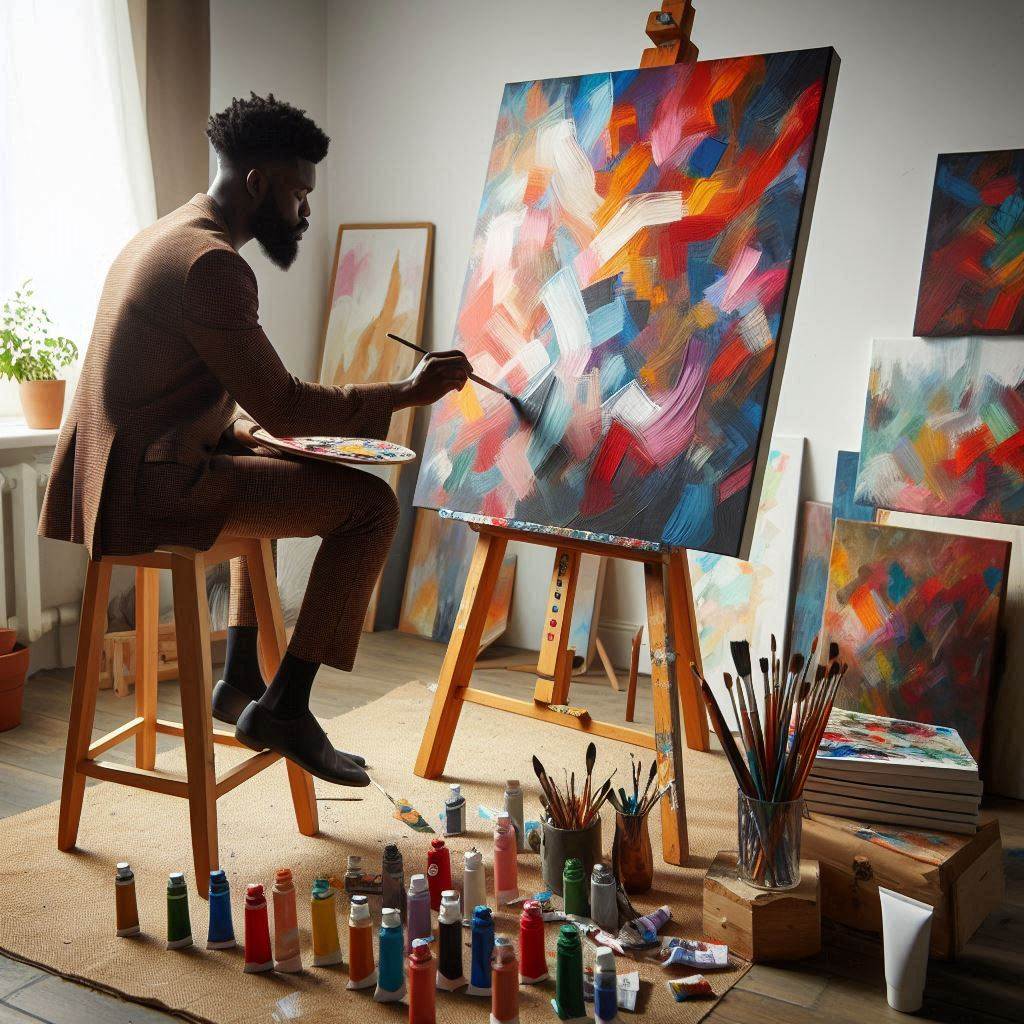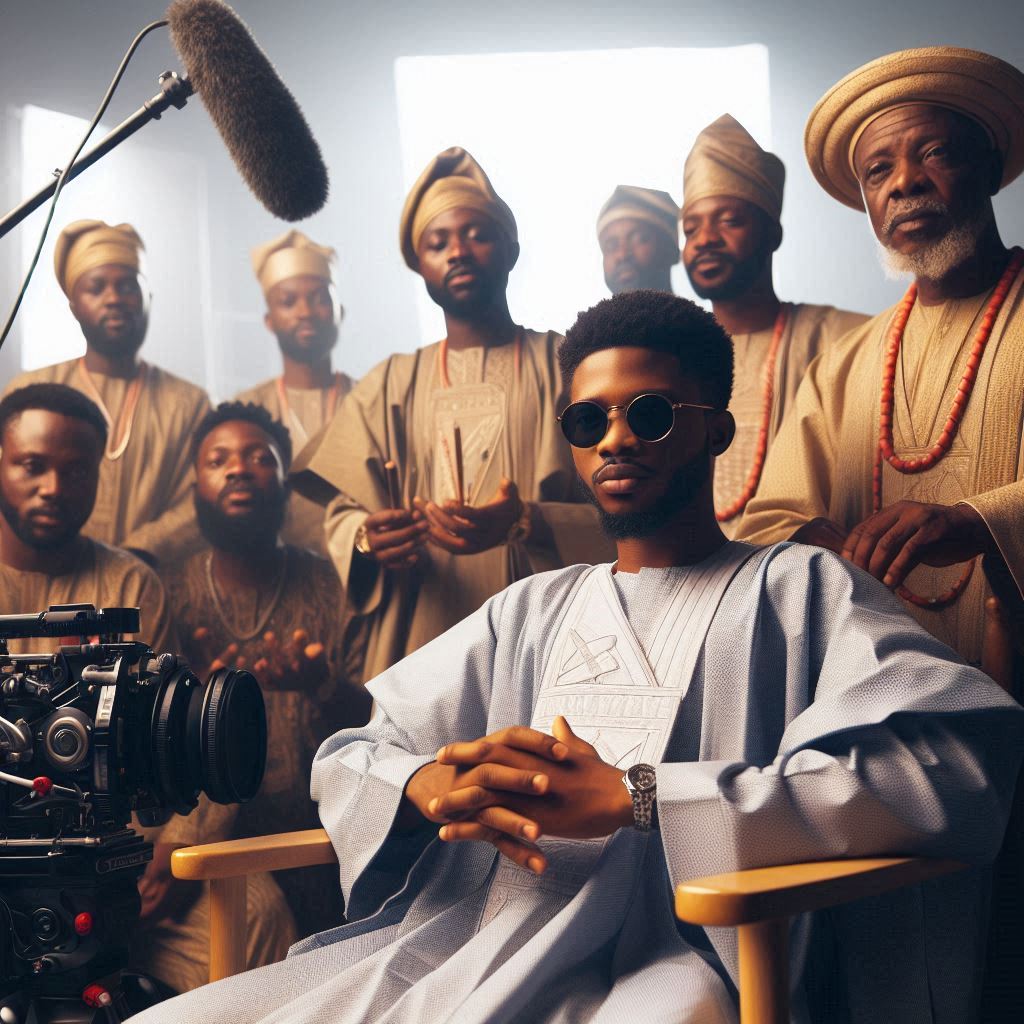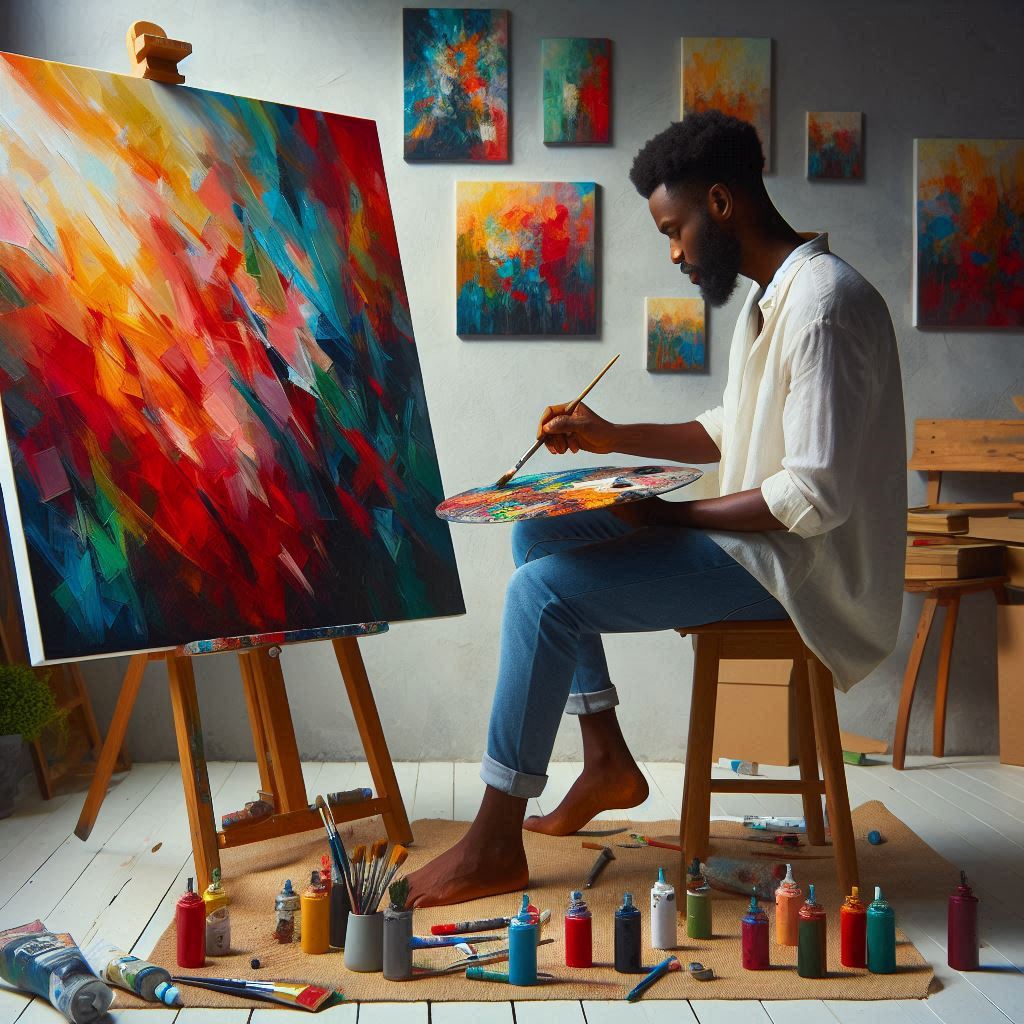Introduction
Government plays a pivotal role in nurturing and showcasing Nigerian arts. It is a cornerstone in preserving cultural heritage and fostering artistic growth.
This blog section explores the vital role of the government in promoting Nigerian arts and its significance in safeguarding the nation’s rich cultural identity.
Importance of Governmental Support
Governmental support is indispensable in preserving Nigeria’s diverse cultural heritage. Through funding and initiatives, the government can provide resources for artists to thrive.
This support ensures that traditional art forms and contemporary expressions continue to flourish, contributing to the nation’s cultural tapestry.
Nigerian arts reflect the country’s vibrant history, traditions, and values. Governmental support is essential in preserving these cultural identities.
By investing in arts education, cultural institutions, and infrastructure, the government can safeguard Nigeria’s unique artistic heritage for future generations.
The arts industry is a significant contributor to Nigeria’s economy. Government support stimulates growth by creating opportunities for artists to showcase their talents locally and internationally.
Cultural events, festivals, and exhibitions attract tourists, generating revenue and fostering economic development.
Encouraging Creativity and Innovation
Government funding encourages artistic innovation and creativity. Grants, scholarships, and subsidies enable artists to explore new techniques and mediums.
By supporting research and development in the arts, the government cultivates a dynamic and thriving creative ecosystem.
Fostering National Unity
Art has the power to transcend boundaries and unite diverse communities. Government-sponsored cultural events and initiatives promote social cohesion and national unity.
Through collaborative projects and cross-cultural exchanges, Nigerian arts become a catalyst for dialogue and understanding among different ethnic groups.
Challenges and Opportunities
Despite the government’s efforts, challenges persist in promoting Nigerian arts. Limited funding, inadequate infrastructure, and bureaucratic hurdles hinder the growth of the arts sector.
However, there are opportunities for improvement through partnerships with the private sector, international collaborations, and advocacy for increased investment in the arts.
Overall, The government plays a crucial role in promoting Nigerian arts, preserving cultural heritage, and fostering artistic excellence.
Through strategic initiatives and investment, Nigeria can harness the power of the arts to drive economic growth, promote social cohesion, and preserve its rich cultural identity.
It is imperative for policymakers to recognize the importance of the arts and prioritize its development for the benefit of present and future generations.
Government Support for Nigerian Arts: A Historical Overview
Throughout history, the Nigerian government has played a pivotal role in nurturing and promoting the country’s rich artistic heritage.
Past Initiatives and Policies
In the early years after independence, the government recognized the importance of arts as a vehicle for cultural expression and national identity.
Initiatives such as the establishment of the National Council for Arts and Culture (NCAC) in 1975 underscored the commitment to supporting artistic endeavors.
Under the leadership of the NCAC, various policies were formulated to provide financial assistance, training programs, and infrastructural support to artists across the nation.
Moreover, the government initiated cultural festivals and exhibitions to showcase Nigerian art forms to both local and international audiences.
Impact on Nigerian Arts Development
The government’s interventions had a profound impact on the development of Nigerian arts.
By providing financial assistance, artists were empowered to pursue their craft without the burden of financial constraints.
Training programs offered by government institutions equipped artists with the necessary skills and knowledge to refine their techniques and explore new artistic horizons.
Additionally, the establishment of cultural festivals and exhibitions served as platforms for artists to showcase their works, thereby increasing visibility and recognition.
These initiatives not only fostered artistic creativity but also contributed to the preservation and promotion of Nigeria’s diverse cultural heritage.
Furthermore, government support facilitated the growth of art infrastructure, including the construction of galleries, museums, and cultural centers.
These facilities not only provided exhibition spaces but also served as hubs for artistic exchange and discourse.
In essence, the government’s involvement in the arts sector catalyzed a renaissance in Nigerian artistic expression.
Challenges and Future Directions
Despite the commendable efforts of the government, challenges persist in the Nigerian arts sector.
Issues such as inadequate funding, bureaucratic red tape, and infrastructural deficiencies continue to hinder the full realization of the sector’s potential.
Moving forward, there is a need for sustained government commitment and collaboration with the private sector and civil society to address these challenges.
Moreover, policies should be revisited and updated to align with contemporary realities and emerging trends in the global arts landscape.
By harnessing the power of the arts, Nigeria can not only enhance its cultural diplomacy but also stimulate economic growth and social cohesion.
Essentially, the history of government involvement in Nigerian arts is a testament to the transformative power of public support in nurturing creativity and preserving cultural heritage.
As the nation embarks on the next phase of its artistic journey, it is imperative to build upon past achievements and forge new pathways towards a vibrant and inclusive arts sector.
Read: The Role of Psychology in Nigerian Corporate Sector
Financial Support for Arts Organizations: Fostering Nigerian Creativity
In the vibrant tapestry of Nigerian culture, the arts stand as pillars, reflecting the nation’s rich heritage and diverse voices. Yet, amidst the brilliance of its artistic landscape, lies the need for sustained support and nourishment.
Here, the role of the government emerges as pivotal, with its capacity to uplift and empower the artistic community.
Government Grants and Subsidies: Nurturing Creativity
Government grants serve as lifelines for arts organizations, offering vital financial support for their endeavors.
These grants can encompass various forms, including project-specific funding, operational grants, and subsidies for infrastructure development.
By allocating funds directly to these entities, the government facilitates the realization of artistic visions and the implementation of cultural initiatives.
Tax Incentives and Rebates: Encouraging Investment in the Arts
In addition to direct financial assistance, the government can employ tax incentives and rebates to stimulate investment in the arts sector.
By providing tax breaks to businesses and individuals who contribute to arts organizations or sponsor cultural events, the government incentivizes private support for the arts.
This symbiotic relationship between public and private sectors fosters a robust ecosystem for artistic expression and cultural enrichment.
Public-Private Partnerships: Amplifying Impact
Public-private partnerships represent a collaborative approach to supporting the arts, wherein the government teams up with corporate entities and philanthropic organizations.
Through these partnerships, the government leverages resources and expertise from the private sector to bolster the arts community.
Such alliances amplify the impact of financial support, enabling arts organizations to expand their reach and impact.
Importance of Funding: Preserving Heritage, Fostering Innovation
Funding plays a paramount role in promoting Nigerian arts and culture on both national and global stages.
At its core, financial support ensures the preservation and celebration of Nigeria’s cultural heritage, safeguarding traditions for future generations.
Moreover, it serves as a catalyst for innovation and experimentation, empowering artists to push boundaries and explore new frontiers of creativity.
Cultural Diplomacy and Global Recognition: Showcasing Nigerian Excellence
By investing in the arts, the government not only nurtures local talent but also enhances Nigeria’s presence on the global cultural landscape.
Through exhibitions, performances, and cultural exchanges funded by the government, Nigerian artists gain international visibility, fostering cross-cultural dialogue and understanding.
This spotlight not only elevates individual artists but also enriches Nigeria’s reputation as a vibrant hub of artistic excellence.
Basically, the government’s role in promoting Nigerian arts through financial support is indispensable.
By investing in arts organizations, offering tax incentives, fostering partnerships, and recognizing the importance of funding, the government cultivates an environment where creativity thrives.
As custodians of Nigeria’s cultural legacy, it is imperative for policymakers to prioritize and prioritize the nurturing of the nation’s artistic soul.
Read: How to Start a Private Psychology Practice in Nigeria
Government’s Vital Role in Cultivating Nigerian Arts
Establishment of Cultural Institutions
The Nigerian government plays a pivotal role in fostering the country’s rich artistic heritage through the creation of cultural institutions. Museums, art galleries, and theaters stand as pillars of cultural preservation and promotion.
Museums serve as custodians of Nigeria’s diverse cultural history. Through government support, these institutions safeguard invaluable artifacts and artworks, providing a tangible link to the nation’s past.
Government-backed art galleries serve as platforms for contemporary Nigerian artists to exhibit their works. These spaces not only showcase talent but also encourage artistic innovation and expression.
Transform Your Career with Expert Guidance
Get personalized mentorship consulting that’s tailored to your unique path. Our expert advice is actionable and exclusive.
Get StartedThe establishment of theaters by the government fosters the growth of performance arts in Nigeria. From traditional dances to modern theater productions, these venues celebrate the country’s rich cultural tapestry.
By investing in cultural institutions, the government ensures the preservation of Nigeria’s cultural identity. Through exhibitions, performances, and educational programs, citizens connect with their heritage and traditions.
Cultural institutions instill a sense of national pride by highlighting Nigeria’s artistic achievements. They provide platforms for artists to share their narratives, fostering unity and appreciation for diversity.
The establishment of cultural institutions creates economic opportunities for artists and related industries. Art tourism, in particular, drives revenue generation and promotes local businesses, contributing to economic growth.
Educational Resources
Government-funded cultural institutions serve as valuable educational resources. Schools and universities utilize museum exhibits, art galleries, and theater performances to enrich curriculum and foster creativity among students.
Through cultural institutions, the government promotes international collaboration and cultural exchange. Partnerships with foreign museums and art organizations facilitate the sharing of artistic practices and ideas.
Despite government efforts, challenges such as funding constraints and inadequate infrastructure persist. Continuous support and investment are crucial to overcome these obstacles and ensure the sustainability of cultural institutions.
Generally, the government’s role in establishing and supporting cultural institutions is indispensable in promoting Nigerian arts.
By preserving heritage, fostering creativity, and fostering national pride, these institutions lay the foundation for a vibrant and flourishing artistic landscape in Nigeria.
Read: Bridging the Gap in Nigerian Mental Health Services

Promotion of Nigerian artists
Government plays a crucial role in promoting Nigerian artists both locally and internationally. There are several ways in which the government can support and encourage the growth of the arts industry in Nigeria.
Funding and Grants
One of the most effective ways the government can support Nigerian artists is by providing financial assistance through grants and funding. This can help artists to create and exhibit their work without financial constraints.
Establishing Artistic Institutions
The government can set up artistic institutions such as art schools, galleries, and cultural centers to nurture talent and provide a platform for artists to showcase their work. This will help in promoting the arts within the country.
Promoting Cultural Exchange Programs
By organizing cultural exchange programs with other countries, the government can help Nigerian artists gain exposure on an international level. This will not only showcase Nigerian talent but also create opportunities for artists to collaborate with global counterparts.
Providing Marketing and Promotion Support
Government bodies can assist artists by providing marketing and promotion support for their work. This can include helping artists to participate in exhibitions, festivals, and events both locally and abroad.
Encouraging Public-Private Partnerships
The government can facilitate partnerships between public and private entities to support Nigerian artists. This can include collaborations with corporate sponsors, foundations, and cultural organizations to promote and fund artistic projects.
The Significance of Showcasing Nigerian Talent Globally
Showcasing Nigerian talent on a global platform is essential for several reasons. It not only promotes the country’s culture and heritage but also brings economic benefits and recognition to Nigerian artists.
Cultural Diplomacy
By showcasing Nigerian talent internationally, the country engages in cultural diplomacy, strengthening relationships with other nations through shared artistic experiences. This can help in promoting a positive image of Nigeria globally.
Economic Opportunities
Participating in international art exhibitions, fairs, and events can open up economic opportunities for Nigerian artists. It can attract investors, collectors, and patrons who are interested in supporting and buying Nigerian art.
Building Global Networks
Showcasing Nigerian talent on a global platform allows artists to build networks with other international artists, galleries, and art institutions. This can lead to collaborations, residencies, and exposure to new markets for their work.
Fostering Creativity and Innovation
Exposure to diverse artistic styles, techniques, and perspectives from around the world can inspire Nigerian artists to push their boundaries and explore new ideas. This can result in greater creativity and innovation in their work.
Enhancing National Pride and Identity
When Nigerian artists achieve recognition and success on a global scale, it instills a sense of national pride and identity among the people. It showcases the richness and diversity of Nigerian art and culture to the world.
In general, the government plays a pivotal role in promoting Nigerian artists both locally and internationally.
By providing support, funding, and opportunities for showcasing talent on a global platform, the government can help in nurturing a vibrant arts industry in Nigeria.
Read: The Future of Psychology Education in Nigeria
Arts education and training programs
Arts education and training programs play a pivotal role in shaping the future of Nigeria’s artistic landscape. These initiatives, spearheaded by the government, serve as the cornerstone for nurturing and honing the talents of aspiring artists across the nation.
Fostering Creativity and Innovation
Government-sponsored arts education programs provide a platform for young Nigerians to explore their creative potential.
Through structured curriculum and mentorship, budding artists are encouraged to experiment, innovate, and push the boundaries of traditional artistic expression.
Access to Quality Instruction and Resources
These programs offer access to experienced instructors and state-of-the-art facilities, leveling the playing field for talented individuals who may lack financial resources.
By democratizing access to artistic education, the government empowers aspiring artists from diverse socio-economic backgrounds to pursue their passion.
Cultivating Cultural Identity and Heritage
Art education programs in Nigeria are not merely about skill development; they are also about preserving and celebrating the rich cultural heritage of the nation.
Through exposure to traditional art forms, young artists gain a deeper appreciation for their cultural identity, fostering a sense of pride and belonging.
Building a Sustainable Arts Ecosystem
By investing in arts education and training, the government lays the groundwork for a vibrant and sustainable arts ecosystem.
Equipped with the necessary skills and knowledge, emerging artists contribute to the cultural fabric of society while also driving economic growth through their creative endeavors.
Empowering Communities Through Art
Government-sponsored arts education programs extend beyond the classroom, engaging communities and promoting social cohesion.
Through collaborative projects and outreach initiatives, aspiring artists become agents of positive change, using their creative talents to address pressing social issues and inspire collective action.
Impact on the Nigerian Arts Sector
The impact of government-sponsored arts education and training programs on the growth and development of the Nigerian arts sector cannot be overstated.
These initiatives serve as a breeding ground for talent, cultivating a new generation of artists who are poised to make significant contributions to the cultural landscape.
A thriving arts sector not only enriches the cultural life of the nation but also serves as an engine for economic growth and job creation.
By nurturing young talent and supporting the development of creative industries, the government stimulates entrepreneurship and innovation, paving the way for sustainable economic development.
In essence, government-sponsored arts education and training programs play a crucial role in nurturing young talent and driving the growth of the Nigerian arts sector.
By investing in the next generation of artists, the government not only preserves cultural heritage but also fosters creativity, innovation, and economic prosperity for the nation as a whole.
Learn More: Exploring Nigerian Literature in Foreign Languages
Find Out More: Art Residencies and Fellowships in Nigeria
Cultural Policy Development: Nurturing Nigeria’s Artistic Essence
Nurturing the Cradle of Creativity
The Nigerian government plays a pivotal role in fostering the country’s rich artistic heritage. By developing and implementing cultural policies, the government can create an enabling environment for the flourishing of the arts.
Empowering Artistic Expression
Cultural policies are essential as they provide a framework for supporting and promoting artistic expression. They facilitate the growth of a vibrant arts sector by offering resources, funding, and infrastructure.
Preserving Cultural Identity
In a diverse nation like Nigeria, cultural policies help preserve and celebrate the country’s cultural identity. They safeguard traditional art forms, languages, and practices, ensuring they thrive amidst modernization.
Encouraging Economic Growth
Cultural policies contribute to economic growth by leveraging the arts as a driver of tourism and commerce. They promote cultural tourism, attracting visitors eager to experience Nigeria’s unique artistic heritage.
Fostering Social Cohesion
By promoting inclusivity and diversity, cultural policies foster social cohesion. They provide opportunities for marginalized communities to participate in and contribute to the cultural landscape, promoting unity and understanding.
Shaping the Artistic Landscape
Cultural policies play a crucial role in shaping the artistic landscape of Nigeria. They influence the type of art that is created, supported, and showcased, guiding the evolution of the country’s cultural narrative.
Through incentives and support mechanisms, cultural policies encourage artistic excellence.
They provide platforms for artists to hone their craft, innovate, and achieve international recognition, elevating Nigeria’s cultural profile on the global stage.
Cultural policies promote arts education, ensuring that future generations are equipped with the skills and knowledge to appreciate and contribute to the arts.
They raise awareness about the importance of cultural heritage and creativity in national development.
By fostering an environment conducive to creativity and innovation, cultural policies cultivate Nigeria’s creative industries.
They support the growth of sectors such as film, music, literature, and fashion, generating employment opportunities and driving economic diversification.
In a nutshell, the development and implementation of cultural policies are imperative for promoting and preserving Nigeria’s rich artistic heritage.
By nurturing creativity, preserving cultural identity, and fostering economic growth, these policies play a vital role in shaping a vibrant and dynamic arts landscape for generations to come.
See Related Content: Importance of Security Studies in Nigeria Today
Collaboration with the Private Sector: Boosting Nigerian Arts
The Nigerian government, alongside the private sector, forms a dynamic duo in the promotion of arts.
Enhanced Visibility through Partnership
Partnerships bring diverse resources, expanding reach and visibility.
Government’s financial backing coupled with private sector innovation amplifies promotional efforts.
These collaborations foster extensive marketing campaigns, penetrating both local and international markets.
Innovative strategies, like art festivals and exhibitions, garner public attention and appreciation.
Sustainability through Joint Initiatives
The symbiotic relationship ensures long-term sustainability of the arts sector.
Private sector investments inject capital, supporting artists’ livelihoods and infrastructure development.
Government policies, complemented by private sector expertise, create conducive environments for artistic growth.
Artisanal training programs, funded jointly, nurture talent pipelines, ensuring the continuity of artistic traditions.
Strategic Alliances: A Win-Win Proposition
Partnerships yield mutual benefits, driving economic growth and cultural enrichment.
Government incentives encourage private sector involvement, fostering a vibrant arts ecosystem.
Private sponsors gain brand exposure and cultural relevance through association with artistic endeavors.
Enhanced cultural tourism, resulting from joint promotional efforts, boosts revenue streams for both sectors.
Empowering Artists through Collaboration
Government grants, supplemented by private sector sponsorships, empower artists financially, enabling creative freedom.
Access to private sector networks opens avenues for international collaborations, broadening artists’ horizons.
Joint mentorship programs provide artists with valuable guidance and exposure to industry best practices.
Collective advocacy efforts, facilitated by collaborations, amplify artists’ voices, influencing policy decisions positively.
Fostering Innovation and Creativity
Collaborative ventures stimulate innovation, fostering the creation of groundbreaking artworks.
Government-funded research initiatives, in partnership with private sector technology firms, drive artistic experimentation.
Access to state-of-the-art facilities, facilitated by private sector investments, fuels creativity and artistic expression.
Cross-disciplinary collaborations between artists and private sector professionals spur innovative cultural products and services.
In fact, collaboration between the Nigerian government and the private sector is pivotal.
Together, they amplify the visibility and sustainability of the arts sector.
Through strategic alliances, artists are empowered, innovation is fostered, and cultural heritage is preserved.
This partnership model serves as a blueprint for fostering a thriving arts ecosystem, driving socio-economic development in Nigeria.
Discover More: Scholarships for Music Students in Nigeria
Explore Further: Mass Communication Degree: Pros and Cons Nigeria
Explore Further: Best Polytechnics for Mass Communication in Nigeria
Conclusion
Supporting Nigerian Arts: A Vital Government Responsibility
The Nigerian government plays a pivotal role in nurturing and preserving the country’s rich artistic heritage.
Government initiatives ensure the preservation of Nigeria’s diverse cultural identity through the promotion of traditional arts.
By investing in the arts, the government stimulates economic growth, creating employment opportunities for artists and artisans.
Government support facilitates the exposure of Nigerian arts on international platforms, enhancing the nation’s global reputation.
The provision of art centers, galleries, and cultural institutions by the government fosters artistic development and innovation.
Government-sponsored programs promote art education and raise public awareness about the significance of Nigerian arts.
Government efforts safeguard intangible cultural heritage, including oral traditions, music, and indigenous crafts, from extinction.
Through funding and incentives, the government preserves traditional craftsmanship, ensuring its continuity for future generations.
Government support encourages the growth of contemporary Nigerian art, fostering creativity and artistic expression.
Art serves as a unifying force, and government-sponsored cultural events promote social cohesion and national unity.
Encouraging Continued Governmental Involvement
To sustain the momentum in promoting Nigerian arts, continued government involvement is indispensable.
As citizens, we must advocate for continued governmental support to preserve and promote Nigerian arts.
Engaging with policymakers and participating in cultural initiatives can amplify the voice for sustained government support.
Recognizing the intrinsic value of arts, citizens should hold governments accountable for their commitment to the arts sector.
Let us unite in our efforts to ensure that Nigerian arts continue to thrive under the support of our government.
In closing, the government’s role in promoting Nigerian arts cannot be overstated. From preserving cultural heritage to stimulating economic growth and fostering social cohesion, governmental support is crucial.
As advocates for the arts, let us continue to press for sustained government involvement, recognizing the immense value that Nigerian arts bring to our society and the world at large.




